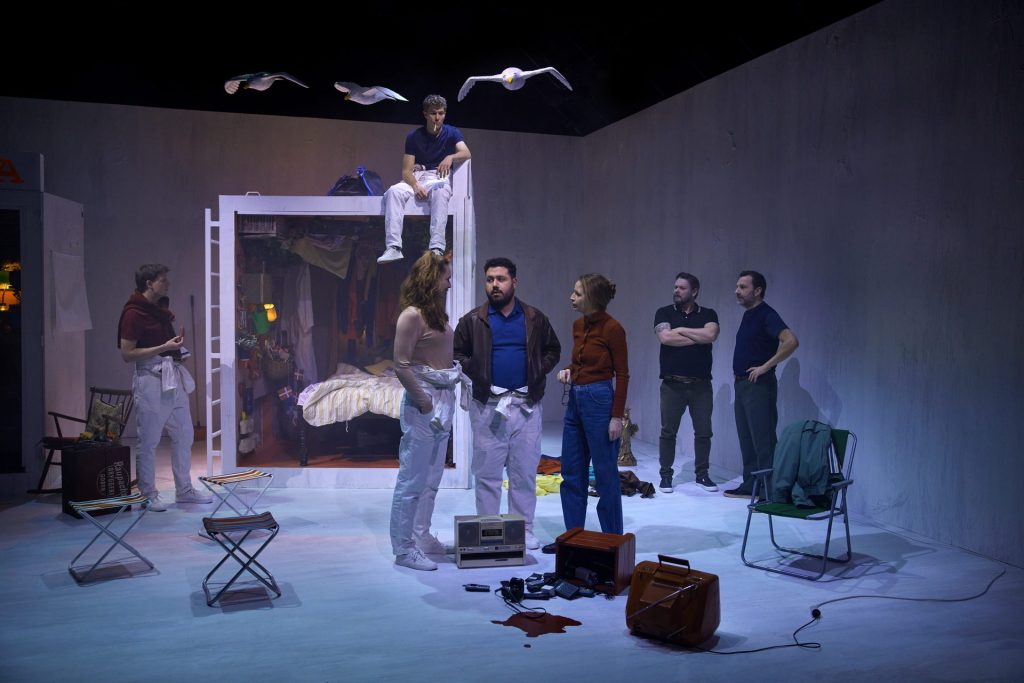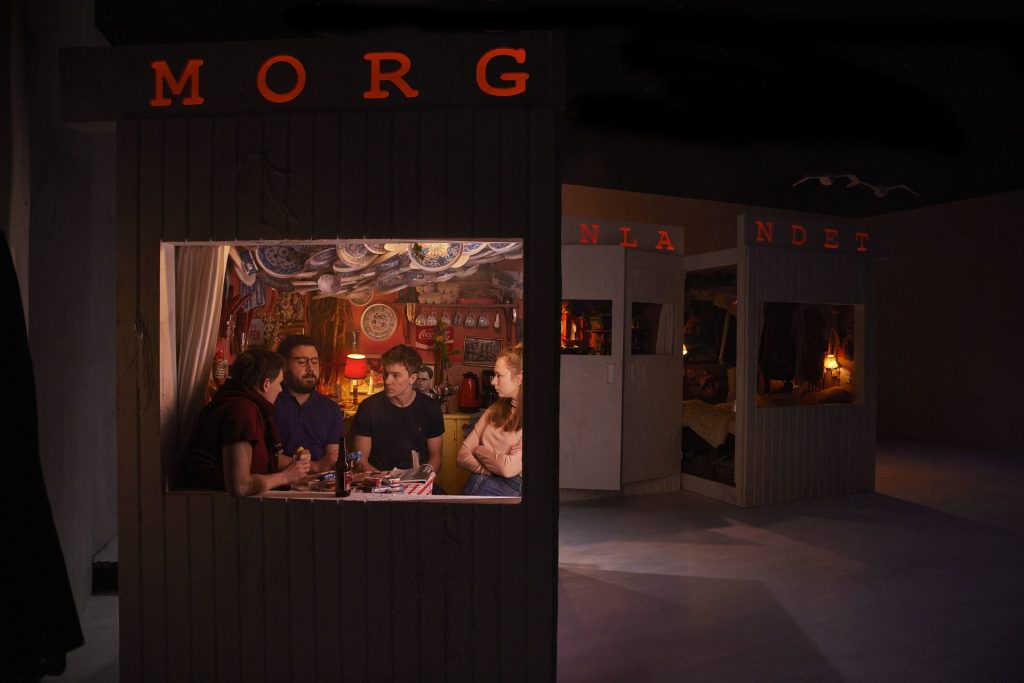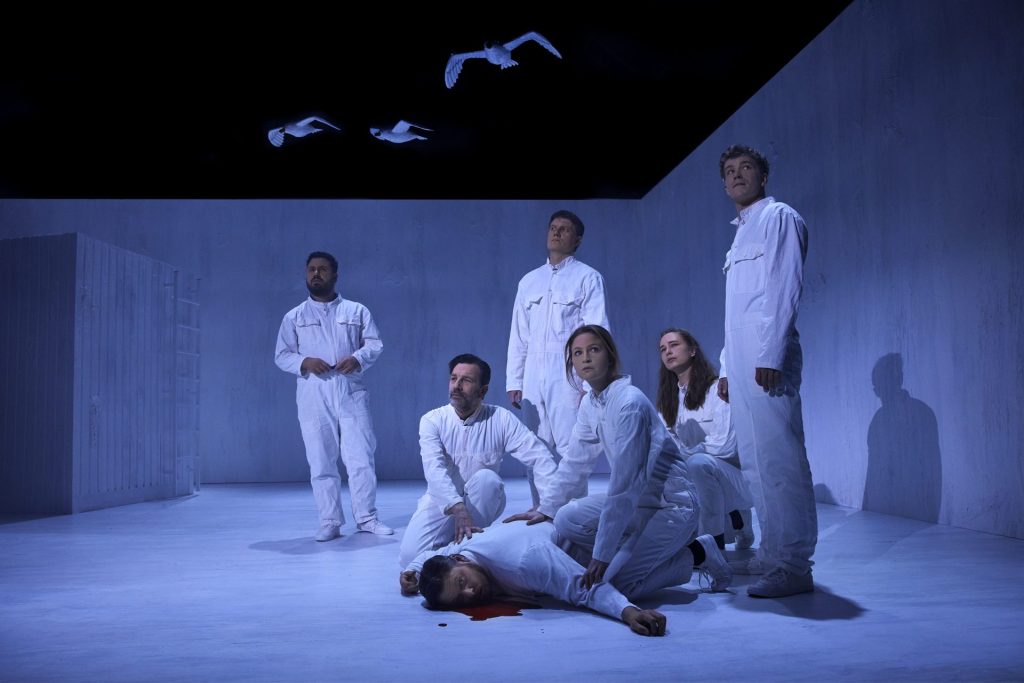The hour we no longer knew what was going on
By Peter M. Boenisch
I left Aalborg Theater’s Lille Scene irritated and agitated, not so much worrying about a neofascist future of Europe, but primarily perturbed by this premiere production of Morgenlandet. It is the third play in Julie Maj Jakobsen’s Europe trilogy, which the playwright began with her 2018 Reumert-awarded Aftenlandet, followed by Efter Branden, both also produced at Aalborg Teater, where she is now the in-house dramatist.
In the new play, Jakobsen takes us onto a square in the middle of an unnamed European city. Around the statue of a Liberty-figure in its middle, which over the years got overgrown by bushes, migrant traders set up their stalls for the weekly flea market. Meanwhile at the corner café, the national leader of the right-wing extremists meets local sympathisers to prepare their big action to ‘reclaim’ the market, waiting for their supporters to join them. The play’s narrative follows this day with its encounters between the four right-wing agitators, an immigrant market trader and his son, a middle-class couple who enjoys the market for its quaint authentic atmosphere, a café waitress struggling as a single mom, and a journalist who covers the Nazi-party’s leader for her newspaper.
And yet, Jakobsen’s play is not about them, nor is it a portrayal of the new radical right. At its core, Morgenlandet is about us: The market square is the playwright’s scenic tool to put on stage what Habermas called our Öffentlichkeit: the confused public discourse of today, the loss of certainties and of orientation of the white European middle class, who dominates the public debates as much as the auditorium at Aalborg Teater. The real drama is our own desperate attempt to come to terms with a Europe of immigration, gentrification, precarious poverty of a new underclass, the dubious role of a press more hungry for sensation than truth, societal polarisation, and the rise of political extremism. Julie Maj Jakobsen packs all these, and at least another two handfuls of current pressing problems, into her 80 minute scenario.

An epic thinking play in a postdramatic form
And surprisingly, her play, at least on paper, manages to navigate this abundance of complex and overwhelming political debates quite well, because Jakobsen relies on a clever dramatic ploy that draws on both the Brechtian tradition of dialectical political thinking plays, and its recent revival in the postdramatic work of playwrights such as Simon Stephens and Roland Schimmelpfennig. Instead of psychologising and confronting us with an awkwardly invented stream of consciousness of a white misogynist, as for instance Nanna Cecilie Bang does in The Supreme Gentleman at Aarhus Teater, Jakobsen introduces a good old-fashioned Brechtian narrator. A puppet player who leads the events that he sets up, in constant dialogue with the actors, who step out of their roles to comment on the action while playing several characters each.
In her dramatis personae, Jakobsen lists only six actors besides the narrator, calling them ‘Kor 1-6’, and dividing all characters (some of which were even cut in the production) between them. Each speech heading in the script emphasises that ‘Kor 1, 2 … 6’ is speaking, and only secondly a dramatic character that this chorus gives voice to. A chorus foregrounds a primary line of direct communication between the stage and the audience. It narrates, presents, demonstrates the action. In Brecht’s theatrical toolbox, the chorus is a tool for epic commentary that embodies Haltung, an attitude, towards the fictional action, thereby inviting the spectators to find their own position. The generation of Brecht and Piscator introduced a form of political theatre that gained its force from exploiting the gap between the representation of a fictional world and the actual reality of playing and watching theatre in the very moment, here and now. Acknowledging this reality was true ‘realism’ for Brecht. It is precisely this kind of realist perspective that gives meaning to Jakobsen’s multi-role conceit: actor Evrim Benli switches, for example, between playing the migrant trader’s nameless son, who will eventually commit an Islamist knife attack, and the Neonazi Marco, who will stage his anti-immigration action in the marketplace with a chainsaw. The play is not so much interested in the dramatic conflict between these two characters as in the very space between, the space that connects them in the market place of our public debates.
All of the characters are mere spokespeople for our confused thoughts and uncertain attitudes, which the narrator desperately tries to organise. ‘Kor 1/Frank’, the leader of the right-wing extremists and the script’s only role that is not doubled, gives voice to the populism, intolerance and hate that we all have in our too human minds – at least if we are honest enough to admit it. Morgenlandet thus builds, as a script, on an at once deeply complex but also incredibly simple poetic conceit, demanding above all attention for the text, concentration, and space and time to sink in, resonate and work through it.
Walls around the market square
Director Camilla Kold Andersen, however, does not seem to trust Jakobsen’s form-driven dramaturgy, as if the play’s epic-postdramatism was not Morgenlandet’s great potential but its flaw. As a result, the director remains unable to ground and situate the postdramatic action in her production. In particular, Andersen closes the vital direct communication axis with the audience, as she seeks to mend the gap the playtext so skilfully opens between the market place fiction and its self-reflection in the presented stage reality. Instead of leaping off the script’s offer to theatricalise the entire play of thoughts, adopted paroles and attempts at making sense, and thus guiding the spectators’ engagement with the playtext’s propositions, Andersen concentrates on showing fictional characters and illustrating the market place action, as if she desperately wants the audience to understand what the playtext, as its very premise, presents as beyond understanding and resolution.
The director’s decision to thus re-normalise the play’s Verfremdungs-dramaturgy quenches the dramatic energy out of Morgenlandet, turning it into a Handke-style hour where we, however, no longer know what on earth is going on in this market square. An impenetrable fourth wall rises up around the stage as the audience is left confused about the shared characters and all the lines that constantly break through the fictional surface, while the actors find themselves deprived of their anchor to inhabit and play with their double-roles, not being allowed to connect directly with their addressees in the auditorium.

Distractions, not irruptions
With Andrea Lindeneg’s materially ambient scenography of white wooden boxes, Aske Bergenhammer Hoeg’s suggestive sound design and Mia Willett’s telling lighting that paints onto the blank wooden canvas, there should have been potential for the mise en scène to frame and ground Jakobsen’s text in theatrical action, but it is mainly used illustratively. The director does not go beyond using the gloomy, uncanny soundscapes to translate how she wants us to feel about the Nazi parade. The lighting equally merely explains an atmosphere, rather than serving the epic frame or exposed theatricality. The direction never develops a sense for activating the space, using the props, or for timing.
An early conspiracy scene of the Nazi-gang was staged with all four actors crammed around a half-hidden table in the far stage-right corner. Instead of feeling like we sat in on their conversation and getting provoked by the familiarity of their arguments as they deliberated the attack on the market, the audience remained distanced and disconnected. Likewise, a pivotal moment when the migrant son hits the pregnant right-wing supporter Rebecca in the face (after having been stirred up by the ever so well-meaning naivety of the white left-wing wife) was inexplicably hidden in the furthest backward corner stage-left, with no time allowed for this plot point to develop scenic momentum.
At times, one can sense Andersen’s intuition, for instance that the tensions embodied by the middle-class couple Eric and Beatrice ought to be the prime focaliser to connect with the audience. Yet, the idea to have the box that contains their living room almost push them from the stage during one of their central dialogues lacks a subtlety in tune with the script. The scene culminates with Steffen Berenthz Eriksen turning the booth for several minutes. Such moments of expressive symbolism, developed from an engagement solely with the fictional characters and the market action, clutter rather than clarify.
The production even misses the script’s ultimate coup, where the migrant son in his eventual terrorist knife act kills … none other than the play’s narrator. Instead of making the spectator ponder about this powerful intertwining of the narrated fiction with the scripted stage reality of theatre (postdramatic scholar Hans-Thies Lehmann even has a name for this recurrent effect often used in this theatre form: ‘the irruption of the real’), we just see someone dropping down into the puddle of stage blood that had been there all along. If it was at all comprehended, no time, space nor direction was allowed for the audience to digest the significance of this ‘irruption’.
In the script’s following concluding scene, the Liberty statue begins to speak and asks disoriented, ‘Where am I?’. It is the only speech heading in the entire playtext – bronzekvinden – not marked with one of the chorus numbers. Chorus 5 – the combined Nazi-islamist terrorist – responds, ‘Det skal jeg sige dig. Dette er en plads i Europa.’ To this suggestive ending, the production just puts the seven actors into a statuesque figuration on the left side of the stage, bathed in a stream of light to the sound of seagulls, whose mirror image had earlier started the evening stage-right. The blunt sunrise-sunset image seemed symptomatic of a production that in its straightforward simplicity remained unable to frame, contain, let alone illuminate the play’s ambitiously complex abstract thought-experiment.

Tomorrow’s morning of our own land
Jakobsen’s play itself is far from flawless. I particularly take issue with her decision to present, if not excuse, the individualised Western characters as politically motivated, while showing the nameless migrant market-traders as driven by emotions and personal history. This scripted racist stereotyping remains too loosely embedded within the epic-narrative construct, as is the plot-twist uncovering that the trader’s son is not his real son. Elsewhere, the sympathetic absurdity of the identitarian activists cutting the bushes around the Liberty statue – in its contrast to the (of course dramaturgically strong) portrayal of the Islamist murder attack – misjudges the antidemocratic threat of right-wing messages of intolerance, hate and supremacy. But Morgenlandet deserves to be read. And staged again.
Jakobsen confirms herself as a talented voice who is developing a strong theatrical and dramatic formal sensitivity for effectively putting a finger right into contemporary political and social wounds. Morgenlandet is, above all, not a Houellebecqian brooding about the threat from the orient that should make us understand racists who stand up to ‘defend’ our aftenlandet. Morgenlandet is a serious and multifaceted reflection of how our land, our Europe, might look tomorrow, pondering how and whether it might even get to a tomorrow, and an attempt at finding a form for articulating the playwright’s inability to find orientation. That she does not pretend to know the answers opens a depth of honesty within this play that still remains to be fully fathomed in a future production.
Morgenlandet spiller til 5.3.2022 på Aalborg Teater.
Medvirkende: Lars Topp Thomsen, Thomas Kristian Bek, Bolette Nørregaard Bang, Marcus Gad Johansen, Line Nørholt, Evrim Benli, Steffen Berenthz Eriksen
Instruktør: Camilla Kold Andersen
Scenograf: Andrea Lindeneg
Lysdesign: Mia Willet
Lyddesign: Aske Bergenhammer Hoeg
Peter M. Boenisch er professor i dramaturgi ved Aarhus Universitet. Han er oprindeligt fra Tyskland og bor i München og Aarhus.
